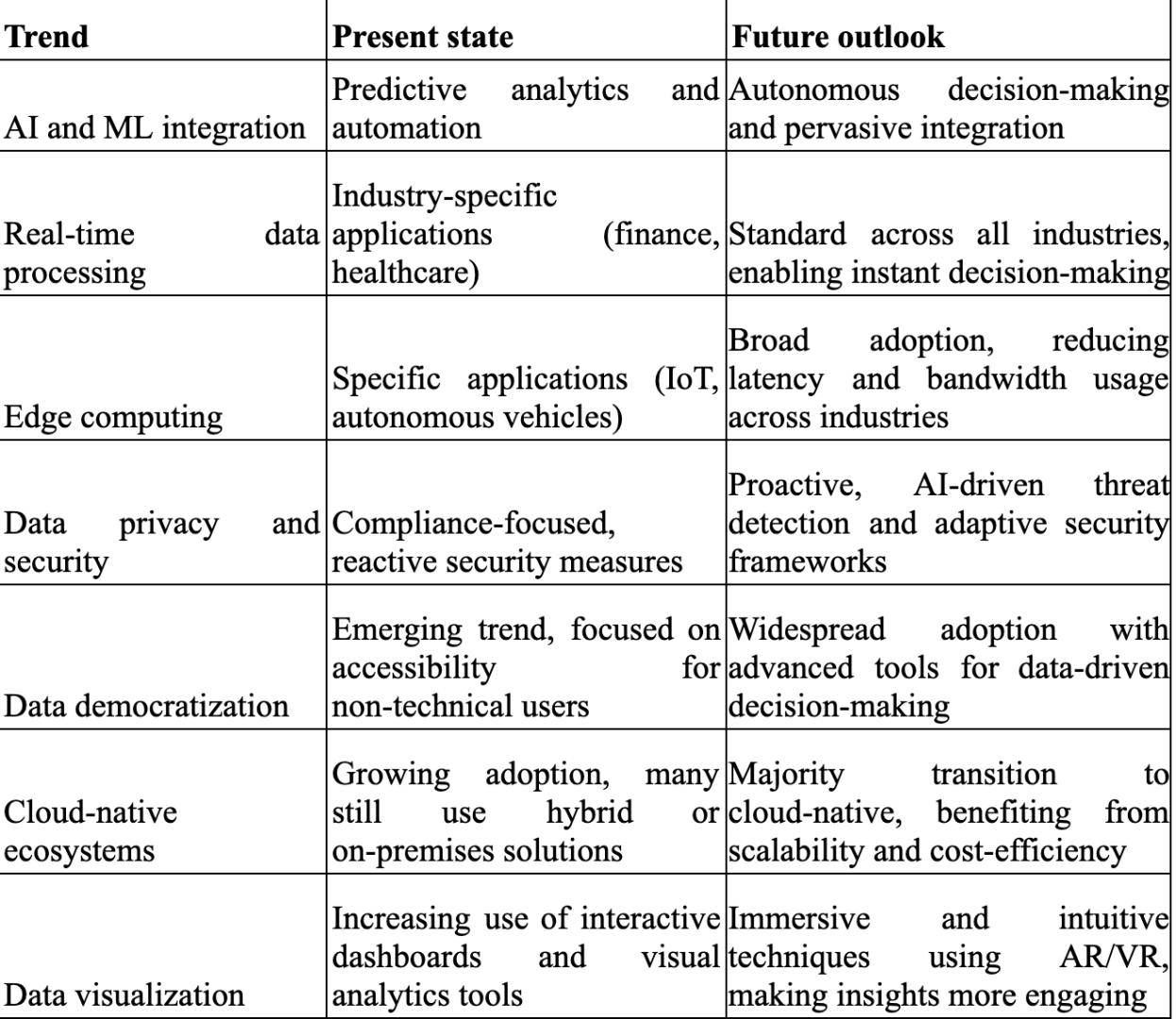
Top 7 Big Data Trends for 2024
As we move deeper into the digital age, the importance and impact of big data continue to expand.
Big data has evolved from a buzzword to a critical aspect of business strategy, technological advancement, and societal change. In 2024, we are witnessing several significant trends in the big data landscape, driven by advancements in technology, growing data volumes, and the increasing importance of data-driven decision-making. Let's explore the top seven big data trends for 2024, with a particular focus on how data engineering services are playing a pivotal role in shaping these trends.
1. AI and ML Integration

Artificial Intelligence (AI) and Machine Learning (ML) have been at the forefront of technological advancements in recent years, and their integration with big data is only accelerating. In 2024, AI and ML are not just tools but integral components of data processing, analysis, and decision-making.
How it’s Changing the Game
AI and ML algorithms are becoming more sophisticated, allowing for more accurate predictions, deeper insights, and automation of complex data tasks. This integration enables businesses to analyze large datasets faster and more effectively, uncovering patterns and trends that were previously hidden.
Role of Data Engineering Services
Data engineering services are crucial in this trend by building and maintaining the infrastructure required for AI and ML models. They ensure that data pipelines are robust, scalable, and capable of handling the vast amounts of data needed for training and deploying AI/ML models.
2. Real-Time Data Processing
The demand for real-time data processing is growing as businesses seek to make quicker, more informed decisions. In 2024, the ability to process and analyze data in real time is becoming a competitive necessity.
How it’s Changing the Game
Real-time data processing allows organizations to respond to events as they happen, rather than relying on historical data. This capability is crucial in industries such as finance, healthcare, and retail, where timely insights can lead to significant advantages.
Role of Data Engineering Services
Data engineering services facilitate real-time data processing by developing and managing streaming data platforms and architectures. They ensure that data flows seamlessly from source to analysis, enabling real-time decision-making and operational efficiency.
3. Edge Computing
Edge computing is revolutionizing the way data is processed and analyzed by bringing computation closer to the data source. In 2024, edge computing is gaining traction, particularly with the proliferation of IoT devices.
How it’s Changing the Game
By processing data at the edge, organizations can reduce latency, improve response times, and decrease bandwidth usage. This is particularly important for applications that require immediate insights, such as autonomous vehicles, smart cities, and industrial automation.
Role of Data Engineering Services
Data engineering services are essential in designing and implementing edge computing architectures. They handle the complexities of data synchronization, processing, and storage at the edge, ensuring that data is both timely and accurate.
4. Data Privacy and Security
As data volumes grow, so do concerns about privacy and security. In 2024, stringent data protection regulations and the increasing sophistication of cyber threats are driving a focus on data privacy and security.
How it’s Changing the Game
Organizations must navigate a complex landscape of data privacy laws and security challenges. Ensuring that data is protected at all stages of its lifecycle is critical to maintaining customer trust and complying with legal requirements.
Role of Data Engineering Services
Data engineering services play a key role in implementing robust security measures and ensuring compliance with data protection regulations. They design secure data architectures, implement encryption, and develop access controls to safeguard sensitive information.
5. Data Democratization
Data democratization is the process of making data accessible to non-technical users within an organization. In 2024, the push for data democratization is growing, as businesses recognize the value of empowering employees with data-driven insights.
How it’s Changing the Game
By democratizing data, organizations can foster a culture of data-driven decision-making across all levels. This leads to increased innovation, efficiency, and competitiveness as employees leverage data to improve their workflows and outcomes.
Role of Data Engineering Services
Data engineering services are instrumental in creating user-friendly data platforms and tools that enable data democratization. They ensure that data is easily accessible, understandable, and actionable for all users, regardless of their technical expertise.
6. Cloud-Native Data Ecosystems
The adoption of cloud-native data ecosystems is accelerating as organizations seek scalable, flexible, and cost-effective solutions for managing big data. In 2024, cloud-native technologies are becoming the standard for data storage, processing, and analysis.
How it’s Changing the Game
Cloud-native data ecosystems offer numerous benefits, including scalability, resilience, and ease of integration with other cloud services. They enable organizations to handle large volumes of data efficiently and adapt quickly to changing business needs.
Role of Data Engineering Services
Data engineering services are vital in migrating traditional data infrastructures to cloud-native environments. They ensure seamless integration, optimize performance, and manage the complexities of cloud-native data operations.
7. Enhanced Data Visualization and Storytelling
Data visualization and storytelling are evolving to meet the needs of increasingly data-savvy users. In 2024, the focus is on creating more intuitive, interactive, and insightful data visualizations that convey complex information effectively.
How it’s Changing the Game
Enhanced data visualization and storytelling techniques help users understand and act on data insights more effectively. By presenting data in a visually appealing and accessible way, organizations can drive better decision-making and communication.

Role of Data Engineering Services
Data engineering services support this trend by developing the infrastructure and tools needed for advanced data visualization. They ensure that data is clean, well-structured, and ready for visualization, enabling users to create compelling data stories.
Future Role of Data Engineering Services
The future role of data engineering services will be critical in supporting these advancements. Here’s how:
-
AI and ML integration: Data engineering will focus on developing advanced data pipelines and ensuring data quality for sophisticated AI/ML models.
-
Real-time data processing: Engineers will create and maintain robust streaming data architectures to support real-time analytics.
-
Edge computing: Data engineers will design distributed data processing systems that efficiently handle edge data.
-
Data privacy and security: Engineers will implement cutting-edge security protocols and ensure compliance with evolving regulations.
-
Data democratization: Data engineering services will build intuitive data platforms that empower all users with accessible and actionable data.
-
Cloud-native ecosystems: Engineers will facilitate the transition to cloud-native environments, optimizing performance and managing cloud resources.
-
Enhanced data visualization: Data engineering will ensure that data is well-structured and ready for advanced visualization tools, supporting immersive data storytelling.

Conclusion
The big data landscape in 2024 is characterized by rapid advancements and evolving trends that are reshaping how organizations collect, process, and leverage data. From AI and machine learning integration to real-time data processing, edge computing, data privacy, data democratization, cloud-native ecosystems, and enhanced data visualization, each trend presents unique opportunities and challenges.
Data engineering services are at the heart of these trends, providing the expertise and infrastructure needed to harness the power of big data. As organizations navigate this dynamic landscape, partnering with skilled data engineering professionals will be crucial to achieving success and staying competitive.
In this era of big data, the ability to adapt and innovate is more important than ever. By embracing these trends and leveraging the capabilities of data engineering services, organizations can unlock new insights, drive growth, and create lasting value in the digital age.
Trending
-
1 How Does SaaS Differ From IaaS And PaaS?
Fabrice Beaux -
2 Single Page Applications vs Multi-Page Applications
Fabrice Beaux -
3 Top 7 Effective Strategies for Multi-Language Website Development
Fabrice Beaux -
4 Boost Engagement to Infinity and Beyond: Unleashing AI-Driven Support
Anas Bouargane -
5 The Cheapest And Most Beautiful Stickers in CS2
Daniel Hall





Comments